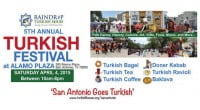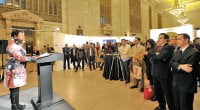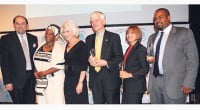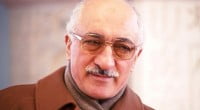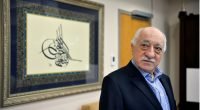A rising profile for Turkish Cultural Center Vermont
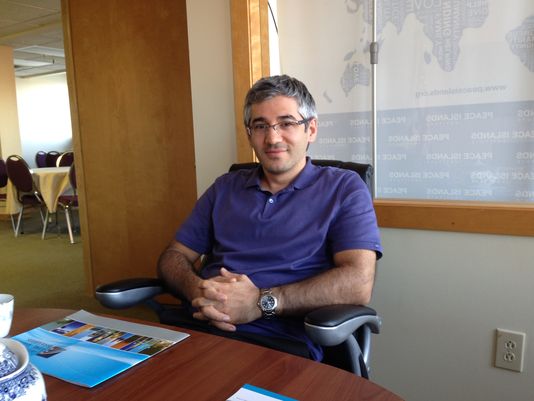
Date posted: September 12, 2014
Tim Johnson
Their demographic footprint in Vermont is pretty small, but in just three years, they’ve made a pretty big splash.
Turkish Americans have fed and entertained the governor and other high officials at celebratory events. They’ve bestowed awards on local luminaries. They’ve sponsored subsidized tours of Turkey for Vermont legislators. And they’ve opened a spacious office in Burlington to serve as a gathering place both for members of their own community and as a hub for their efforts at cultural and educational outreach.
The Turkish Cultural Center Vermont, a nonprofit organization, offers Turkish language classes and serves as a platform for promoting both Turkish culture and cross-cultural understanding. As a focal point for one of the many ethnic and linguistic groups that have found their way to Vermont, it has achieved noteworthy visibility.
That’s partly because its professed embrace of diversity and tolerance finds a receptive audience in Vermont. Perhaps it’s only natural that the high profile of Turkish Americans’ new organization belies their relatively low numbers.
Vermont’s center is not unique, however. Connecticut, Maine, Massachusetts and New Hampshire also have Turkish cultural centers, and they all have websites designed with the same template and much of the same verbiage.
“We the Turkish Americans believe that promoting respect and mutual understanding among all cultures and faiths is one of the critical means to create a harmonious environment,” reads the mission statement for Vermont, and for the other states.
A movement
The centers in New England, and in many other states around the country, were set up with the assistance of the Council of Turkic American Associations, part of the Turkic American Alliance. The Alliance seeks to help Turkic Americans both preserve their own culture and integrate into American society. “Turkic” refers to people who speak languages in Turkish language family, ethnic groups in Turkey and scattered across eastern Europe and central Asia.
The council and the participants in the many of the centers are supporters of the Gülen movement.
Fethullah Gülen is a visionary Turkish leader, a preacher and educational activist who has lived in Pennsylvania since 1998 and who has legions of adherents in Turkey and elsewhere. The Gülen website characterizes the movement as non-political and “distinguished for its support of democracy, its openness to globalization, its progressiveness in integrating tradition with modernity, and its humanistic outlook.” The Gülen movement fell out of favor over the last couple of years with Turkish President Recep Tayyip Erdogan, in part as a result of a corruption scandal.
Adem G. Aydin, one of the founders of the Turkish Cultural Center Vermont, said he read Gülen’s works when he was a student in Turkey and was inspired by Gülen’s notion of “embracing differences” and ensuring that “differences have an opportunity to survive.” These are principles he hopes the center can embody and promote.
“From time to time, Turkish Cultural Centers organize events and have collaboration with the movement-affiliated institutions,” wrote another of the Vermont center’s co-founders, Eyup Sener, in an email. “So we can say there is a relation with the Gülen Movement. While there is no formal relationship with Fethullah Gülen himself, a large number of our members are indeed supportive of Fethullah Gülen’s democratic principles of secularism, equal opportunity and free enterprise.”
Aydin went to college in Turkey, then attended graduate school in Syracuse, where there was a Turkish cultural center. After he earned his Ph.D. in electrical engineering, he moved to Vermont to take a job with IBM and began thinking of setting up a center here. Vermont was one of the few states without one.
Vermont start-up
Founded in 2011, the Vermont center took a while to get going, but its organizers drew on the experiences in other states.
On April 18, 2012, the center sponsored its first Turkish Cultural Day at the Vermont Statehouse, with a reception attended by, among many others, Gov. Peter Shumlin, House Speaker Shap Smith and Burlington Mayor Miro Weinberger. The day before, the center had presented Shumlin with a check for $5,000 for Tropical Storm Irene aid from the Hizmet Relief Foundation. “Hizmet” is a Turkish name for the Gülen movement.
Similar statehouse events have been held in other states over the last eight years, Sener said. The first was in Albany, N.Y.
“A Turkish Cultural Day’s main mission is to strengthen ties between America and Turkey and celebrate the rich heritage of friendship and cooperation between the two countries,” he said.
The Vermont center’s website has a report, and a photo gallery, of an eight-day tour of Turkey in July 2012 by about a dozen Vermont legislators. Legislators paid their own airfare and some other transportation expenses. Tuskon, a Turkish business confederation, paid for accommodations, according to Aydin. Last year, the center facilitated a similar trip to Turkey and to Azerbaijan, where the official language, Azeri, is Turkic.
Rep. Jean O’Sullivan, D-Burlington, went on that first tour, she said, because she saw Turkey as a stable Middle Eastern country that serves as “an honest broker” between the West and the Islamic world. She recognized the tour sponsors were affiliated with the Gülen Movement, which impressed her with its emphasis on education and science and with its message of tolerance — qualities she sees playing out in the Turkish Cultural Center Vermont.
“Any Islamic institution that works on a solid principle of inclusion and education is a net benefit to the community,” she said.
“It was an extremely interesting trip,” said Rep. Michael Yantachka, D-Charlotte, another member of that first tour group. (He has since joined the center’s board of advisors, but says he hasn’t given much advice.) Interspersed with sightseeing were meetings with government officials, educators and business people. The trip was all about building awareness, Yatachka said.
Neither Turkey nor Turkish Americans, per se, have any issues pending at the Vermont Legislature, nor does the Vermont center have a lobbyist. Gülen-inspired charter schools have been set up in some states, notably Texas, but Aydin said he knows of no plans for any in Vermont.
Neither O’Sullivan nor Yantachka listed the travel subsidy in their campaign-finance reports, the main venue for legislators to acknowledge gifts.
“I didn’t consider that it had anything to do with my campaign,” Yantachka said. “They weren’t trying to influence me on anything.”
The trip cost him about $1,600, Yantachka said, roughly half of the overall expense.
In effect, he said, it was “a cheap vacation.”
O’Sullivan noted that similar tours have been sponsored in other states. Tours have also been organized for educators and media people. Vermont journalists have received invitations, but so far, there have been no takers.
As for the Vermont-Turkey economic relationship, there’s plenty of room to grow. According to the Agency of Commerce and Economic Development, Vermont’s exports to Turkey in 2013 amounted to about $1.9 million (a tiny fraction of the $4 billion to all countries). Imports from Turkey tally about $5.7 million (total global imports: $4.9 billion).
Nearly $3 million of those Turkish imports fell in the category “arms and ammunition,” up from close to zero three years before. Calls to Vermont gun dealers with import licenses didn’t clarify who’s importing what in the way of firearms.
O’Sullivan characterized the Turkish economy as “mature,” and said Vermont might do well to explore investment prospects under the EB-5 program that provides investors with green cards. She noted that New Hampshire has done more to cultivate economic ties with Turkey, that states’s 12th largest trading partner.
In June, Turkish Cultural Center New Hampshire co-sponsored a week-long trade mission to Turkey led by Gov. Maggie Hassan.
By the numbers
The size of the Turkic American population in Vermont is an open question.
The U.S. Census Bureau’s American Community Survey estimates the number of people in Vermont who were born in Turkey at 65. (The estimate covers the years 2008-12.) The estimate for those in Vermont who report their “first ancestry” as Turkish: 182.
Of the more than 6,700 refugees who have been resettled in Vermont since 1989, fewer than 300 are believed to have been Turkish speakers. In the middle years of the last decade (2000-2010), Vermont received 34 refugees from Azerbaijan 55 from Uzbekistan, and 99 from Russia. Many were categorized as Meskhetian Turks, ethnic Turks who were forcibly dispersed through central Asia during the Stalin era. Since their arrival in Vermont, most have moved to other states, according to the Vermont Refugee Resettlement Program.
Sener, a co-founder of the Vermont center, said he researched the Turkic population of New England — including Turks, Azeri, Kazkh, Uzek, Turkmen, Meskhetian Turks, and so on — and came up with a figure of “around 3,000.”
Co-founder Aydin said the Turkish Cultural Center Vermont has about 100 members. It was their input that led to the selection of the award winners at the first Friendship Dinner, held in November at the Sheraton Hotel Conference Center. Shumlin came away with the leadership award, Attorney General Bill Sorrell with the community service award, and Free Press executive editor Michael Townsend with the “media award.”
Six months later, Shumlin and Sorrell were among those who showed up to cut the ribbon for the center’s new office, on the 5th floor of 125 College St.
Shumlin said then he hoped the center would promote cultural understanding and help the state grow jobs and exports.
“I know that it will serve us well in the future,” he said in May.
Among the center’s members is Cengiz Akgul, who said he came to Vermont for a job as a software engineer. He said he sees the center as “a place for our community members to gather to keep alive our heritage and introduce our culture” to others.
Akgul said his children have taken weekend language classes and he has participated in events.
On a recent morning, Aydin opened the office to welcome a visitor. Aydin offered tea and Turkish delights. The fifth-floor quarters also feature a lounge, a classroom and a larger room that can seat up to 50.
Aydin said members’ contributions support the organization, which has monthly budget capped at $2,500. That covers rent, utilities and all other expenses, he said. Rental fees from private parties and fees for Turkish language classes bring in a little income, he said. Food for public events is typically donated.
The center, which has no paid employees and is open only by appointment, remains something of a work in progress. Aydin envisions more outreach programs, including to Burlington’s sizable Bosnian community. The center has no political or religious agenda, he said, adding that members vary in their political views and their religious practices.
The center is meant to be a place for the Turkic community, he said, but also a place that will help Turkic people become integrated in Vermont.
“We don’t want to be a closed community,” he said.
Source: Burlington Free Press , September 12, 2014
Tags: Dialogue | North America | USA |

